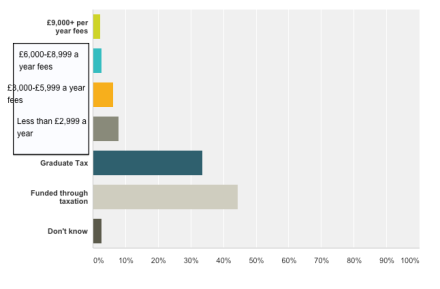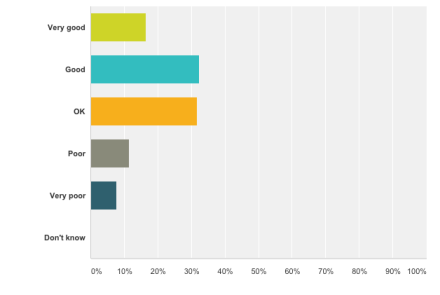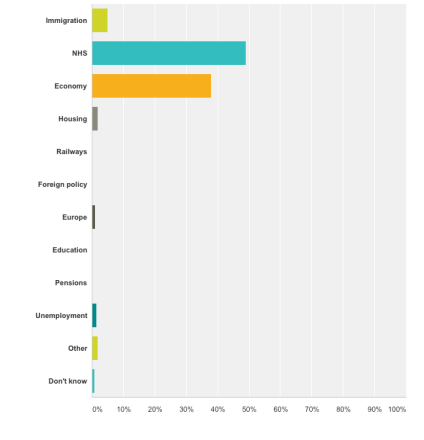Labour are yet to announce what their policy on higher education funding will be. We’ve been waiting with bated breath for a while now.
There have been some rumblings that a Graduate Tax or a reduction in fees could be on the cards (the first is strongly advocated by Shadow Universities Minister Liam Byrne and the second floated by Ed Miliband back in 2011). But nothing has been formally announced.
With the general election only a handful of months away, it looks like an announcement on higher education will be made soon. Before that happens, we wanted to know what LabourList readers think is the best funding options.
The largest amount of people think neither of Labour’s potential plans are the right way forward – with 45% opting to choose a return to pre-tuition fees days; funding higher education through taxation. Despite this support, it’s unlikely this will be made Labour policy.
The policy with the second largest amount of support is a graduate tax with 34% saying this was their preferred method of funding.
There’s little support for any kind of fees-based system, regardless of the bands. Although, there’s less support the further up the scale you go: 8% were in favour of less than £2,999 a year, 6% said £5,999-£3,000, 3% £8,999-£6,000 – little support, then, in the ball park of Miliband’s original proposals – and 2% looked as though they supported the current system of £9,000+ a year .
Only 3% said they didn’t know, implying that most people are pretty sure in their decision.
One of our rolling questions in the weeks coming up to the general election will give LabourList readers the space to voice how they think Ed Miliband is performing as Labour leader.
With so much criticism launched against him in the media, it’s important to hear what LabourList readers – among them are grassroots supporters and activists – think of his performance.
The results are OK. Last time we asked this question, in the wake of reports citing anonymous Labour MPs were calling for him to go, 51% said he was doing a Very Good or Good job. Given the context in which we asked this question last time, it’s little surprise that there’s been a minor dip of 2 points – 49% said Very good (17% opted for this) or Good (32%).
However, 32% said he was doing Ok, not exactly the kind of accolade you want to receive so close to a general election.
The proportion of people who think he’s doing either Very poor (8%) or Poor (12%) has dropped by 5points from 25% to 20%. While only 2 people – o.2% – said they didn’t know.
With an ever-rising A&E crisis, the NHS last week emerged as the top issue of concern for people ahead of the general election. The picture among LabourList readers looks much the same. 49% said they thought the NHS would be the biggest issue of the election, while 38% said the economy.
Most other categories had pretty low numbers. Much to Farage’s disappointment, only 5% said they thought immigration would be the biggest issue. 2% said housing ,1% Europe and 1% unemployment. The same small number (0.2%) said railways, foreign policy 0.2% and pensions. While no one at all said education, 2% opted for other and 0.8% for don’t know.
This doesn’t mean the issues that scored in single digit figures aren’t seen as important issues, just that they won’t be the most focussed on before May.
825 people voted in this weeks survey. Thankyou to everyone who took part.







More from LabourList
Government abandons plans to delay 30 local elections in England
‘The cost of living crisis is still Britain’s defining political challenge’
‘Nurses are finally getting the recognition they deserve’